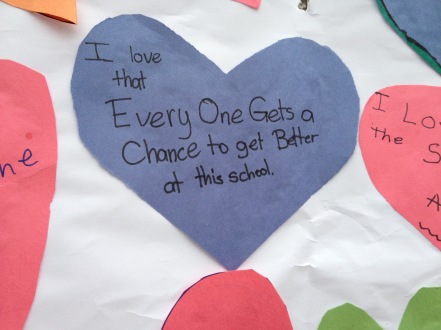SO… I am giving a DIBELS assessment on Friday of week three of the school year. After listening to my student read and retell three short stories, it is evident that she reads with less fluency than she could. She rushes past punctuation marks which causes her phrasing to be off. During readers workshop I carry around a clipboard. It has a space for each student’s name and room for notes. My 31 students fill four pages. I go to write this in the space I have for her, but OH! I already have this written down. I already know this about her. In addition, my notes also reflect that she lacks word-attack skills, and needs some strategies for figuring out both the meaning and pronunciation of words that are new or tricky to her. I also know and have written about her lack of bringing character voices to life when she reads. There is no drama to her reading, no storytelling quality, yet. Oh, and I also have written down that she would benefit from some work around reading a question carefully so that her answer reflects what she knows, or doesn’t, instead of a random answer that doesn’t match the question being asked.
How do I know all of this? I gave her a running record the first week of school. It took me about five minutes of interview and reading aloud time and about 30 minutes for her to read a short story and write down her answers to four comprehension questions. It took me about four minutes to review her answers after school and record the results. I did this for all of my students. It took me most of the first two weeks. The time is well spent however, because the information I gathered has turned into plans for small group instruction. I have formed a group and planned two weeks of activities for this group around word attack strategies. I have done the same for a group that needs fluency work around punctuation and phrasing. And the same again for a group that will have some fun with character voices and using dialogue to make a scene come alive. I have also taken note of trends and patterns that hold true for most of my students and have turned these into whole group mini-lessons. For example, I have noted through observations that most of my students are not using their reader’s notebook yet, and so I plan to invite them to study ways in which writing about reading can help us grow ideas about the stories we read, the characters we meet and how they change, and the deeper meanings and lessons about life that these stories hold.
Ready to teach I am! OH… but I can’t. Instead of teaching and interacting with my students in the meaningful ways I have planned based on the data I collected through my assessments, my district, the Los Angeles Unified School District, has determined that I need to administer DIBELS to each of my students. I have not decided this. I don’t find it useful. Each and every single time I administer it, I get less-than-I-already-know-and-not-new information about my readers. I have to do it during class time, and including the DAZE portion, it takes about ten minutes per student. I am directed to do this. So instead of teaching quality and targeted lessons to my students, I have to waste nearly two weeks of reading instruction time on an additional and meaningless assessment.
I should also mention that once I have finished giving DIBELS, it gives me a colored dot next to every name. Red means the student needs lots of support, yellow, solid support, green less than that and blue merely “core support,” whatever that means. Does that mean “regular and effective teaching that happens in my classroom when I am allowed to teach and not test?” Well, isn’t that ironic.
It is important to state this truth: none of these colored dots give me any new information. In fact I could predict their color with near 100% accuracy before I have met my students because I already know who needs intensive support based on the notes and data that I pull off of our school’s shared database where we keep reading data that helps us know our students and where they stand in relation to grade level benchmarks. And, as much as I know that each reader I will work with this year is much more than a colored dot, and will surprise and amaze me, if I need that quick snapshot of information, my school has been keeping it and using it for the past fifteen years. Before some privatizer who makes money off of DIBELS convinced our district that it was a valid use of our precious resources and time. Yeah, you’re right, that is probably another blog post.
When teachers complain that they want to teach more and test less, this is what we are talking about. The district’s relentless assessments take away actual teaching time. Assessment has a place in our schools. But it should inform instruction in meaningful and useful ways. Mandates should be limited in scope and used only when the need for a uniform assessment outweighs the damage we do to students when we take away their instructional time for the sake of assessment after assessment after assessment.



